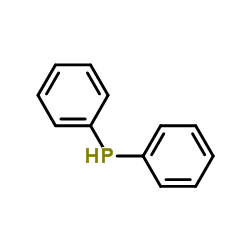Diphenylphosphine

Diphenylphosphine structure
|
Common Name | Diphenylphosphine | ||
|---|---|---|---|---|
| CAS Number | 829-85-6 | Molecular Weight | 186.189 | |
| Density | 1.07 g/mL at 25 °C(lit.) | Boiling Point | 275.0±13.0 °C at 760 mmHg | |
| Molecular Formula | C12H11P | Melting Point | 65-67ºC (338-340 K) | |
| MSDS | Chinese USA | Flash Point | 120.1±19.8 °C | |
| Symbol |


GHS02, GHS07 |
Signal Word | Danger | |
|
Mechanistic insight into the formation of cationic naked nanocrystals generated under equilibrium control.
J. Am. Chem. Soc. 136(44) , 15702-10, (2014) Cationic naked nanocrystals (NCs) are useful building units for assembling hierarchical mesostructured materials. Until now, their preparation required strongly electrophilic reagents that irreversibly sever bonds between native organic ligands and the NC sur... |
|
|
Photoswitching a molecular catalyst to regulate CO2 hydrogenation.
Dalton Trans. 44 , 14854-64, (2015) Inspired by nature's ability to regulate catalysis using physiological stimuli, azobenzene was incorporated into Rh(bis)diphosphine CO2 hydrogenation catalysts to photoinitiate structural changes to modulate the resulting catalytic activity. The rhodium bound... |
|
|
Lifetime, mobility, and diffusion of photoexcited carriers in ligand-exchanged lead selenide nanocrystal films measured by time-resolved terahertz spectroscopy.
ACS Nano 9(2) , 1820-8, (2015) Colloidal semiconductor nanocrystals have been used as building blocks for electronic and optoelectronic devices ranging from field-effect transistors to solar cells. Properties of the nanocrystal films depend sensitively on the choice of capping ligand to re... |
|
|
Applications of Fluorine in Medicinal Chemistry.
J. Med. Chem. 58 , 8315-59, (2015) The role of fluorine in drug design and development is expanding rapidly as we learn more about the unique properties associated with this unusual element and how to deploy it with greater sophistication. The judicious introduction of fluorine into a molecule... |
|
|
HIF-2α-mediated induction of pulmonary thrombospondin-1 contributes to hypoxia-driven vascular remodelling and vasoconstriction.
Cardiovasc. Res. 109 , 115-30, (2015) Hypoxic conditions stimulate pulmonary vasoconstriction and vascular remodelling, both pathognomonic changes in pulmonary arterial hypertension (PAH). The secreted protein thrombospondin-1 (TSP1) is involved in the maintenance of lung homeostasis. New work id... |
|
|
Schow, S. R.; Bloom, J. D. et al.
J. Am. Chem. Soc. 108 , 2662, (1986)
|
|
|
Posner, G. H.; Nelson, T. D.
J. Org. Chem. 56 , 4339, (1991)
|
|
|
Brumwell, J. E.; Simpkins, N. S. et al.
Tetrahedron Lett. 34 , 1215, (1993)
|